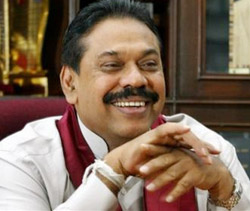Rajapaksa — The family man
 The Legatum 2009 survey on wealth and wellbeing says Sri Lankans value their families and turn to them in troubled times.
The Legatum 2009 survey on wealth and wellbeing says Sri Lankans value their families and turn to them in troubled times.
The example of family kinship is possibly coming from the top. Nobody knows the importance of family more than President Mahinda Rajapaksa.
He is the second among four brothers — the Rajapaksas are nine brothers and sisters — at the top of the power hierarchy of this country. As he gears up for Presidential polls in January, Rajapaksa — like he did during the war against the Liberation Tigers of Tamil Eelam (LTTE) — will turn to his brothers for support and counsel.
Unlike his three younger brothers, Mahinda, Basil and Gotabhaya, the eldest Chamal, the ports and aviation minister, maintains a low profile. He is seldom heard making political comments.
Gotabhaya as the defence secretary is seen as the shrill hardliner, not very good at diplomacy and always ready for a tough retort.
Basil Rajapaksa takes care of the politics that encircles the President; he is a man with ears to the political ground. He is handling the crucial task of resettling the Tamil refugees and would play a key role during the Presidential campaign. Both Gotabhaya and Basil are also two of the main interlocutors for Rajapaksa when it comes to India.
A crucial fifth element during the war against the Tigers will be his opponent as the President gears up for the political battle. Retired and hurt general Sarath Fonseka, besides the President and Gotabhaya, was part of the trinity perceived to be the LTTE’s vanquisher.
Not very long ago, Fonseka was considered Family. But within days of his resignation as the chief of defence staff, an angry Fonseka has had to find a new home.
Chamal Rajapaksa was once quoted as having said: “from our small days we maintained the family unity. We are there when one is in trouble.’’ Following the general alert, that unity could be the key to the Rajapaksa family’s wellbeing.